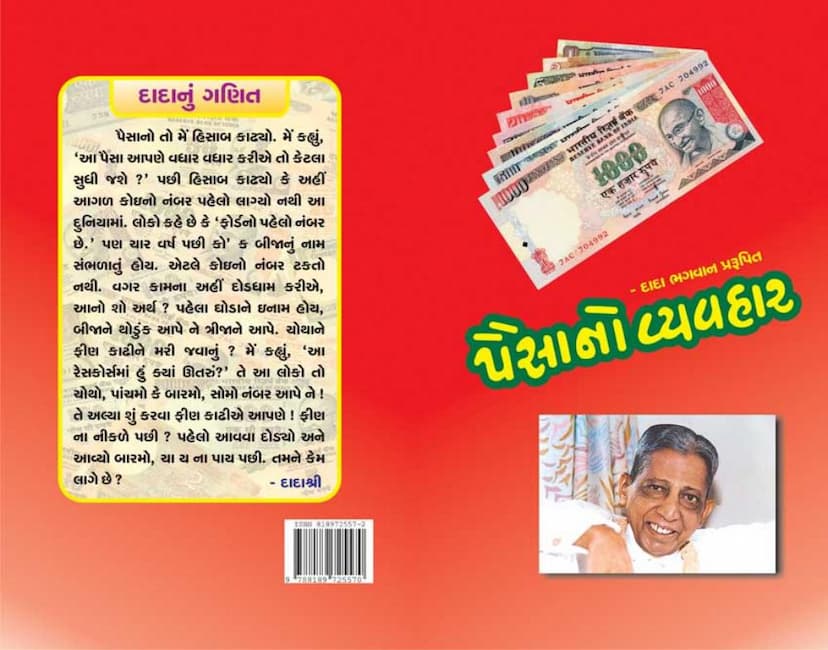Paisa No Vyavahar Granth
Added to library: September 2, 2025

Summary
This Jain text, "Paisa No Vyavahar Granth" (Book on Monetary Transactions) by Dada Bhagwan, published by Dada Bhagwan Foundation, explores the spiritual and practical aspects of wealth and its management from a Jain perspective, particularly through the lens of Dada Bhagwan's teachings. The summary covers the following key themes:
1. Understanding Wealth (Lakshmi): The text emphasizes that wealth (Lakshmi) is fleeting and temporary, often seen as "hand-dust" or a byproduct of past deeds. It highlights that true happiness does not come from accumulating wealth, but from detachment from it. The book contrasts the pursuit of Lakshmi with the pursuit of Narayan (the Divine), suggesting that attachment to one leads to the neglect of the other.
2. The Nature of Wealth and its Acquisition: Dada Bhagwan explains that wealth is not earned solely through hard work or intelligence, but is primarily a result of past actions and karma (punya). He illustrates this with examples of mill owners who possess wealth without apparent effort, while laborers who work hard may struggle. The text cautions against unethical means of acquiring wealth, emphasizing that dishonest practices lead to negative consequences and are considered "fools' wisdom."
3. Managing Wealth and Detachment: The book stresses the importance of managing wealth with detachment and right understanding (samyaq samaj). It advises against excessive attachment to wealth, as it can lead to more worries and ultimately fail to provide lasting happiness. The teachings suggest a balanced approach, where wealth is used for legitimate needs and good deeds, but without creating strong possessiveness (mamta).
4. The Role of Wealth in Spiritual Progress: While acknowledging the necessity of wealth for worldly transactions, the text emphasizes that true wealth lies in spiritual progress and self-realization (moksha). It suggests that excessive focus on wealth can hinder spiritual growth. The ultimate aim is to transcend the attachment to material possessions and realize the true Self.
5. Generosity and Use of Wealth: The text encourages generosity (daan) and using wealth for the welfare of others and for righteous purposes. It distinguishes between different forms of charity, highlighting knowledge-donation (gyan-daan) and fearlessness-donation (abhay-daan) as particularly meritorious. The teachings advise against using wealth for mere show or ego-boosting purposes.
6. The Illusion of Wealth and True Security: Dada Bhagwan's teachings highlight that material wealth, no matter how vast, cannot guarantee happiness or security. True security and lasting peace are found in spiritual understanding and self-realization. The book critiques the modern tendency to accumulate wealth without a clear purpose or understanding of its impermanence.
7. The Importance of Right Intention and Detachment: The core message revolves around maintaining inner purity and detachment, even while engaging in worldly transactions. The teachings emphasize the importance of the inner intention (bhav) behind actions, rather than the actions themselves. By understanding the transient nature of wealth and the true nature of the Self, one can progress towards spiritual liberation.
8. The Cycle of Karma and Wealth: The text explains that the accumulation and loss of wealth are governed by karma. While past karma influences present wealth, it is through present actions, intentions, and understanding that one can influence future outcomes and progress towards spiritual goals.
In essence, "Paisa No Vyavahar Granth" offers a spiritual perspective on wealth, guiding readers to manage their finances with ethical understanding, detachment, and a focus on spiritual growth, ultimately leading to inner peace and liberation.